Thursday, May 09, 2013
Daily Marian Prayer And Image
From The Glories Of Mary, by Saint Alphonsus de Liguori:
O most pure Virgin Mary, I venerate thy most holy heart, which was the delight and resting-place of God, thy heart overflowing with humility, purity, and divine love.
I, an unhappy sinner, approach thee with a heart all loathsome and wounded. O compassionate Mother, disdain me not on this account; let such a sight rather move thee to greater tenderness, and excite thee to help me. Do not stay to seek virtues or merit in me before assisting me. I am lost, and the only thing I merit is hell. See only my confidence in thee and the purpose I have to amend. Consider all that Jesus has done and suffered for me, and then abandon me if thou canst.
I offer thee all the pains of his life; the cold that he endured in the stable; his journey into Egypt; the blood which he shed; the poverty, sweats, sorrows, and death that he endured for me; and this in thy presence. For the love of Jesus, take charge of my salvation.
O, my Mother, I will not and cannot fear that thou wilt reject me, now that I have recourse to thee and ask thy help. Did I fear this, I should be offering an outrage to thy mercy, which goes in quest of the wretched, in order to help them.
O Lady, deny not thy compassion to one to whom Jesus has not denied his blood. But the merits of this blood will not be applied to me unless thou recommendest me to God. Through thee do I hope for salvation. I ask not for riches, honors, or earthly goods. I seek only the grace of God, love towards thy Son, the accomplishment of his will, and his heavenly kingdom, that I may love him eternally.
Is it possible that thou wilt not hear me? No; for already thou has granted my prayer, as I hope; already thou prayest for me; already thou obtainest me the graces that I ask; already thou takest me under thy protection. My Mother, abandon me not. Never, never cease to pray for me, until thou seest me safe in heaven at thy feet, blessing and thanking thee forever.
Amen.
Ascension Thursday, 2013

Happily, the Archdiocese of Boston adheres to the old rule, that the Ascension falls 40 days after Easter, on a Thursday. And even if it didn't, since I follow the 1962 Ordo (with some exceptions and additions) today would still be Ascension Thursday, a holy day of obligation.
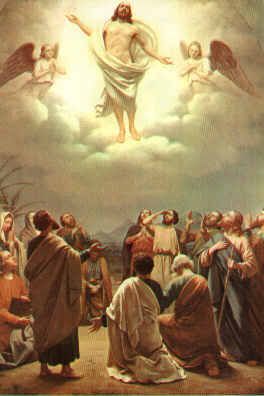
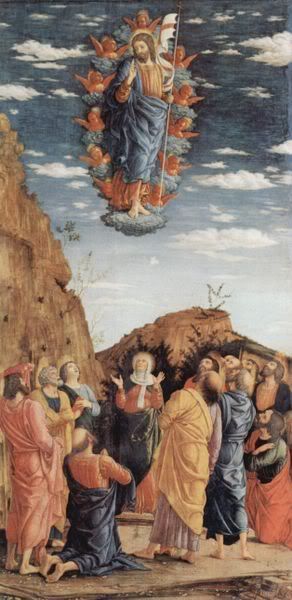
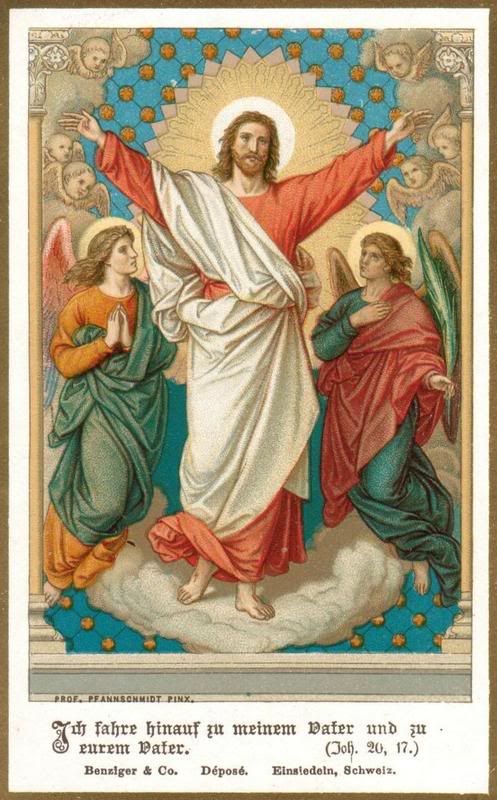
Wednesday, May 08, 2013
Daily Marian Prayer and Image

O my most sweet Mother, how shall I die, poor sinner that I am? Even now the thought of that important moment when I must expire, and appear before the judgment seat of God, and the remembrance that I have myself so often written my condemnation by consenting to sin, makes me tremble. I am confounded, and fear much for my eternal salvation.
O Mary, in the blood of Jesus, and in thy intercession, is all my hope. Thou art the Queen of Heaven, the mistress of the universe; in short, thou art the Mother of God. Thou art great, but thy greatness does not prevent, nay even it inclines thee to greater compassion towards us in our miseries.
Worldly friends, when raised to dignity, disdain to notice their former friends who may have fallen into distress. Thy noble and loving heart does not act thus, for the greater the miseries it beholds, the greater are its efforts to relieve. Thou, when called upon, dost immediately assist; nay more, thou dost anticipate our prayers by thy favors; thou consolest us in our afflictions; thou dissipatest the storms by which we are tossed about; thou overcomest all enemies; thou, in fine, never losest an occasion to promote our welfare.
May that divine hand which has united in thee such majesty and such tenderness, such greatness and so much love, be forever blessed! I thank my Lord for it, and congratulate myself in having so great an advantage; for truly in thy felicity do I place my own, and I consider thy lot as mine.
O comfortress of the afflicted, console a poor creature who recommends himself to thee. The remorse of a conscience overburdened with sin fills me with affliction. I am in doubt as to whether I have sufficiently grieved for them. I see that all my actions are sullied and defective; hell awaits my death in order to accuse me; the outraged justice of God demands satisfaction.
My Mother, what will become of me? If thou dost not help me, I am lost. What sayest thou, wilt thou assist me?
O compassionate Virgin, console me; obtain for me true sorrow for my sins; obtain for me strength to amend, and to be faithful to God during the rest of my life. And finally, when I am in the last agonies of death, O Mary, my hope, abandon me not; then, more than ever, help and encourage me, that I may not despair at the sight of my sins, which the evil one will then place before me.
My Lady, forgive my temerity; come thyself to comfort me with thy presence in that last struggle. This favor thou hast granted to many, grant it also to me. If my boldness is great, thy goodness is greater; for it goes in search of the most miserable to console them. On this I rely.
For thine eternal glory, let it be said that thou hast snatched a wretched creature from hell, to which he was already condemned, and that thou hast led him to thy kingdom. O yes, sweet Mother, I hope to have the consolation of remaining always at thy feet, in heaven, thanking and blessing and loving thee eternally. O Mary, I shall expect thee at my last hour; deprive me not of this consolation. Fiat, fiat. Amen, amen.
Rogation Wednesday
One of the glories of Catholicism is its ability to incorporate so many varying interests in aspects of our Catholic Faith under the same general rubric. Some Catholics are devoted to the Rosary, others to the Sacred Heart. Some especially revere Our Lady of Mount Carmel, others Our Sorrowful Mother. Some love the devotion of the Five Sacred Wounds, while others cling just as doggedly to the devotion of the Fifteen Os of Saint Bridget. Some are clients of this saint, some of that.
The Church's manner of accommodating so many varying interests has been to foster guilds devoted to these aspects of Catholic piety. The creation of a group of people devoted to a particular aspect of the Faith allows like-minded folks to interact, but at the same time keeps them within the bounds of our Mother the Church. The Church, in the modern parlance, is a "Big Tent." So long as you adhere to the Magesterium in matters of faith and morals, and live within the Church and its teachings, no one is going to make a fuss if you prefer to pray to St. Michael as the escort of souls, or to St. Joseph as the patron of a happy death, or to the general patronage of Our Blessed Lady, when you pray for a happy and holy death.
Guilds for a particular devotion have a long history, and were present in England before the protestant rebellion. They thrived in the 19th century, and were still going strong before the post-Vatican II tidal wave nearly wrecked everything. I believe, though I don't have any evidence to support this at the moment, that they are making a quiet comeback today. Where the Church is healthy, you will still find active St. Vincent de Paul Societies, and busy Holy Name Societies. The Spanish Penitents i profiled during Holy Week are modern devotional guilds.
As I said, the devotional guilds were a part of Catholic life well before the 1500s. And of course, as the parish community processed on important feast days, like the Rogation Days, the guilds took part. The processed together as a group (and one can imagine that the parish priest had to diplomatically allot the guilds' respective places in the procession).
Each group had some sort of banner. Often these banners were ephemeral, like the felt things one sees in churches today. But sometimes they were crafted symbols of the guild.
I have only found one image of surviving guild banners for procession. They are from France, and probably do not predate the French Revolution.
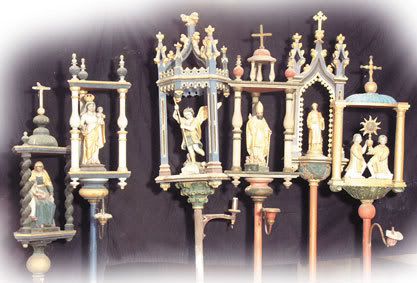
But one can see a Catholic community dividing itself into its "little platoons" and processing behind the Crucifix and the parish priest in small groups as they perambulate the parish, asking blessing on the crops, praying the Litany of the Saints, and beating the bounds of the parish.
The Church's manner of accommodating so many varying interests has been to foster guilds devoted to these aspects of Catholic piety. The creation of a group of people devoted to a particular aspect of the Faith allows like-minded folks to interact, but at the same time keeps them within the bounds of our Mother the Church. The Church, in the modern parlance, is a "Big Tent." So long as you adhere to the Magesterium in matters of faith and morals, and live within the Church and its teachings, no one is going to make a fuss if you prefer to pray to St. Michael as the escort of souls, or to St. Joseph as the patron of a happy death, or to the general patronage of Our Blessed Lady, when you pray for a happy and holy death.
Guilds for a particular devotion have a long history, and were present in England before the protestant rebellion. They thrived in the 19th century, and were still going strong before the post-Vatican II tidal wave nearly wrecked everything. I believe, though I don't have any evidence to support this at the moment, that they are making a quiet comeback today. Where the Church is healthy, you will still find active St. Vincent de Paul Societies, and busy Holy Name Societies. The Spanish Penitents i profiled during Holy Week are modern devotional guilds.
As I said, the devotional guilds were a part of Catholic life well before the 1500s. And of course, as the parish community processed on important feast days, like the Rogation Days, the guilds took part. The processed together as a group (and one can imagine that the parish priest had to diplomatically allot the guilds' respective places in the procession).
Each group had some sort of banner. Often these banners were ephemeral, like the felt things one sees in churches today. But sometimes they were crafted symbols of the guild.
I have only found one image of surviving guild banners for procession. They are from France, and probably do not predate the French Revolution.

But one can see a Catholic community dividing itself into its "little platoons" and processing behind the Crucifix and the parish priest in small groups as they perambulate the parish, asking blessing on the crops, praying the Litany of the Saints, and beating the bounds of the parish.
Tuesday, May 07, 2013
Daily Marian Prayer and Image

O compassionate Mother, most sacred Virgin, behold at thy feet the traitor, who, by paying with ingratitude the graces received from God through thy means, has betrayed both thee and him. But I must tell thee, O most blessed Lady, that my misery, far from taking away my confidence, increases it; for I see that thy compassion is great in proportion to the greatness of my misery. Show thyself, O Mary, full of liberality towards me: for thus thou art towards all who invoke thy aid.
All that I ask is that thou shouldst cast thine eyes of compassion on me, and pity me. If thy heart is thus far moved, it cannot do otherwise than protect me: and if thou protectest me, what can I fear? No, I fear nothing; I do not fear my sins, for thou canst provide a remedy; I do not fear devils, for thou art more powerful than the whole of hell; I do not even fear thy Son, though justly irritated against me, for at a word of thine he will be appeased.
I only fear lest, in my temptations, and by my own fault, I may cease to recommend myself to thee, and thus be lost. But I now promise thee that I will always have recourse to thee; O, help me to fulfill my promise. Lose not the opportunity which now presents itself of gratifying thy ardent desire to succor such poor wretches as myself. In thee, O Mother of God, I have unbounded confidence.
From thee I hope for grace to bewail my sins as I ought, and from thee I hope for strength never again to fall into them. If I am sick, thou, O heavenly physician, canst heal me. If my sins have weakened me, thy help will strengthen me. O Mary, I hope all from thee; for thou art all-powerful with God.
Amen.
Rogation Tuesday
Since Rogationtide processions went on during all three days before Ascension Thursday, and there is a practical limit to how many times the congregation can chant the Litanies, and participate in the various prayers offered for newly-planted crops, something else needed to be added to occupy those in the procession. And that is the beating of the bounds.
As time went by, with parish and property lines often marked by natural features like a protuberant stone, those boundary lines often became blurred and shifted, either through natural events (a stream drying up or shifting) or human action (moving a stone to move the property line). A parish might want to exclude a home from its territory if the inhabitants were poor and shiftless and likely to become a charge on the charity of the parish. Or it might want to include more affluent homes on the edge of the boundary.
So, over time, means were devised to create a living memory of just where the boundary line was, regardless of the natural features mentioned in any grants or deeds. What was devised was this. During one or more of the Rogation Processions, the young boys of the parish were brought along and enjoined to memorize the exact line of the boundary. The boys would be beaten with narrow sticks to ensure their proper memorization, and to chastise them if their memory was faulty. Thus, the "Beating of the Bounds."
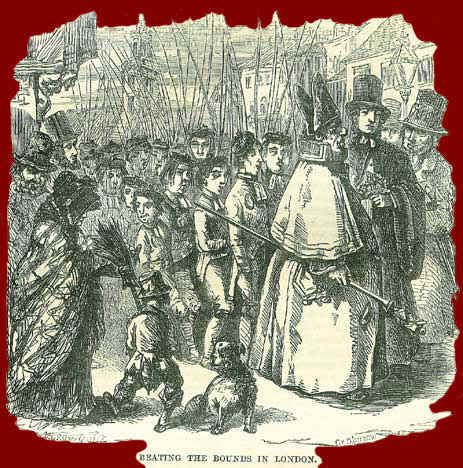
Today, when a "Beating of the Bounds" occurs, it tends to be in England, and to be a High Church Anglican thing. They have the old territorial parishes and the parish churches, since the protestant rebellion. English Catholics today, having less official status and being more scattered, take little interest in such local displays. Also today, it appears that New Age pagans like to attach themselves to Beating of the Bounds processions during Rogationtide, since it is a seasonal fancy-dress occasion. And they are joined by morris dancers, town criers, handbell guilds, and so on.
But the origins of the procession and the beating of the bounds are firmly Catholic. Perhaps someday, the vehicle of the Rogation Procession will be reunited to the Catholic practice that gave rise to it.
As time went by, with parish and property lines often marked by natural features like a protuberant stone, those boundary lines often became blurred and shifted, either through natural events (a stream drying up or shifting) or human action (moving a stone to move the property line). A parish might want to exclude a home from its territory if the inhabitants were poor and shiftless and likely to become a charge on the charity of the parish. Or it might want to include more affluent homes on the edge of the boundary.
So, over time, means were devised to create a living memory of just where the boundary line was, regardless of the natural features mentioned in any grants or deeds. What was devised was this. During one or more of the Rogation Processions, the young boys of the parish were brought along and enjoined to memorize the exact line of the boundary. The boys would be beaten with narrow sticks to ensure their proper memorization, and to chastise them if their memory was faulty. Thus, the "Beating of the Bounds."

Today, when a "Beating of the Bounds" occurs, it tends to be in England, and to be a High Church Anglican thing. They have the old territorial parishes and the parish churches, since the protestant rebellion. English Catholics today, having less official status and being more scattered, take little interest in such local displays. Also today, it appears that New Age pagans like to attach themselves to Beating of the Bounds processions during Rogationtide, since it is a seasonal fancy-dress occasion. And they are joined by morris dancers, town criers, handbell guilds, and so on.
But the origins of the procession and the beating of the bounds are firmly Catholic. Perhaps someday, the vehicle of the Rogation Procession will be reunited to the Catholic practice that gave rise to it.
Monday, May 06, 2013
Daily Marian Prayer And Image
From The Glories Of Mary, by Saint Alphonsus de Liguori:
O Mother of holy love, our life, our refuge, and our hope, thou well knowest that thy son Jesus Christ, not content with being himself our perpetual advocate with the eternal Father, has willed that thou also shouldst interest thyself with him, in order to obtain the divine mercies for us. He has decreed that thy prayers should aid our salvation, and has made them so efficacious that they obtain all that they ask. To thee therefore, who art the hope of the miserable, do I, a wretched sinner, turn my eyes.
I trust, O Lady, that in the first place through the merits of Jesus Christ, and then through thy intercession, I shall be saved. Of this I am certain; and my confidence in thee is such, that if my eternal salvation were in my own hands, I should place it in thine, for I rely more on thy mercy and protection than on all my own works.
My mother and my hope, abandon me not, though I deserve that thou shouldst do so. See my miseries, and, being moved thereby with compassion, help and save me. I own that I have too often closed my heart, by my sins, against the lights and helps that thou hast procured for me from the Lord. But thy compassion for the miserable, and thy power with God, far surpass the number and malice of my sins.
It is well known to all, both in heaven and on earth, that whosoever is protected by thee is certainly saved. All may forget me, provided only that thou dost remember me, O Mother of an omnipotent God. Tell him that I am thy servant; say onl that thou defendest me, and I shall be saved. O mary, I trust in thee; in this hope I live; in it I desire and hope to die, repeating always, "Jesus is my only hope, and after Jesus the most Blessed Virgin Mary" ("Unica spes mea Jesus et post Jesum Virgo Maria").
Amen.
Rogation Monday
From a University of Chicago site:
The Rogation Days are three (or four) days focused on agriculture and nature, where we pray for a good harvest, fruitful crops, good weather, and protection from flood, tornado, earthquake, and other natural disasters. Traditionally the Church offers these requests on the Monday, Tuesday, and Wednesday before the Feast of the Ascension, although some churches also add the Sunday before Ascension, before Rogation Monday. (The Catholic Church marks April 25 as the Major Rogation, and the days before Ascension as the Minor Rogation.)
Rogation comes from the Latin rogatio and French rogare, meaning "to ask." Fifth-century France was beset with a number of natural disasters, including floods, failing harvests, and an earthquake on Ascension (which always falls on a Thursday). In response to these calamities Mamertus, Bishop of Vienne, called for three days of prayer, fasting, and repentance, and this quickly became the custom for the three days preceding Ascension.
The observance of Rogation Days spread throughout Europe (In England, the days are also known as Gang-Days, Gang-Week, or Cross-Week.) Many churches led a procession around the town or parish boundaries on one of the Rogation Days, chanting a litany to the saints and offering prayers for a good year. This practice became known as "beating the bounds." George Herbert recommends this practice in A Country Parson (see chapter 25).
Many churches in farming communities continue to observe a traditional Rogation.Other churches are adapting the Rogation services to a technology-based society.
Read more about Rogation Days here, here, here, and here.
Sunday, May 05, 2013
Daily Marian Prayer And Image
From The Glories Of Mary, by Saint Alphonsus de Liguori:
Behold, O Mother of my God, my only hope, Mary, behold at thy feet a miserable sinner, who asks thee for mercy. Thou art proclaimed and called by the whole Church, and by all the faithful, the refuge of sinners. Thou art consequently my refuge; thou hast to save me. I will say with William of Paris, Thou knowest, most sweet Mother of God, how much thy Blessed Son desires our salvation ("Tu . . . enim, dulcissima Dei Mater, nosti quantum placeat benedicto Filio tuo salus nostra"—Rhèt. Div. c. 18). Thou knowest all that Jesus Christ endured for this end. I present thee, O my Mother, the sufferings of Jesus: the cold that he endured in the stable, his journey into Egypt, his toils, his sweat, the blood that he shed, the anguish which caused his death on the cross, and of which thou wast thyself a witness. O, show that thou lovest thy beloved Son, and by this love I implore thee to assist me. Extend thy hand to a poor creature who has fallen, and asks thy help. Were I a saint, I would not need seek thy mercy: but because I am a sinner, I fly to thee, who art the Mother of Mercies. I know that thy compassionate heart finds its consolation in assisting the miserable, when thou canst do so, and dost not find them obstinate. Console, then, thy compassionate heart, and console me this day; for now thou hast the opportunity of saving a poor creature condemned to hell; and thou canst do so, for I will not be obstinate. I abandon myself into thy hands, only tell me what thou wouldst have me do, and obtain for me strength to execute it, for I am resolved to do all that depends on me to recover the divine grace. I take refuge under thy mantle. Jesus wills that I should have recourse to thee, in order not only that his blood may save me, but also that thy prayers may assist me in this great work; for thy glory, and for his own, since thou art his Mother. He sends me to thee, that thou mayst help me. O Mary, see, I have recourse to thee; in thee do I confide. Thou prayest for so many others, pray also for me; say only a word. Tell our Lord that thou willest my salvation, and God will certainly save me. Say that I am thine, and then I have obtained all that I ask, all that I desire.










































































































